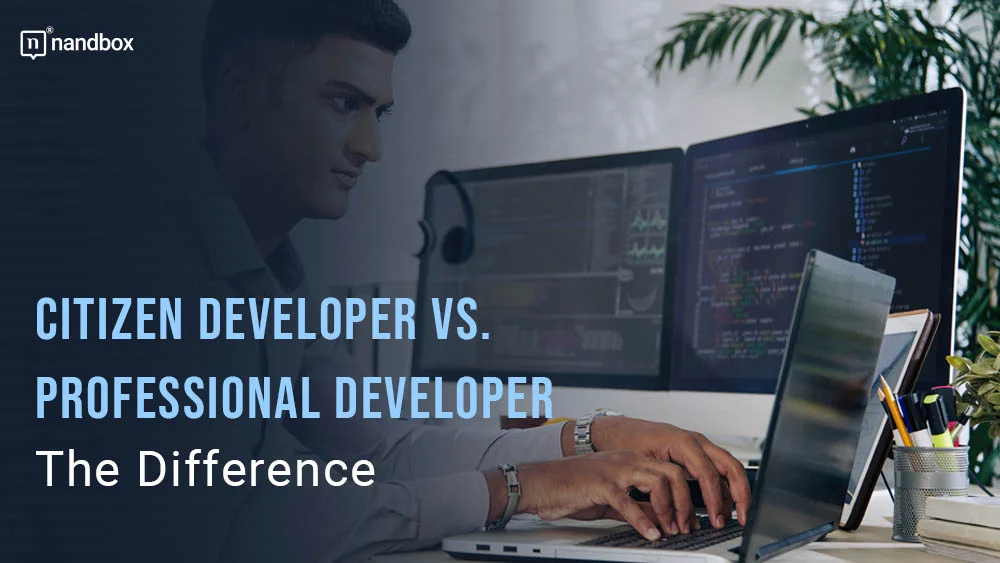Citizen Developer VS. Professional Developer: The Difference
According to statistics, around 0.3% of the world's population are professional software developers, meaning there’s a shortage compared to the constant need for innovative software. The scarcity isn’t surprising, as tech experts predicted it years ago. Today, the low-code, no-code movement is trying to fill the gap, assigning software creation to citizen developers. This article explains the job of a citizen developer VS. a professional developer, and the pros and cons.
Who is a Citizen Developer?
No-code platforms rely on visuals and drag-and-drop mechanisms to create software, meaning they don’t require any technical skills. Anyone can use them, and anyone is called a citizen developer.
The no-code movement is a booming industry worth billions of dollars. And it will continue to grow because it’s efficient and convenient for companies. That foretells more demand for citizen developers, which isn’t much of an issue. Citizen development doesn’t require any technical skills, just requires someone with good digital skills, and, well, who doesn't have those today?
Who is a Professional Developer?
A professional developer also creates software and can maintain and upgrade it. The difference is that they are seasoned in coding and use it to develop that software. They understand the core concepts of creating software and have technical skills.
Why Companies Adopt Citizen Development
In the traditional work model, employees rely on the IT department to solve technical problems. It takes a lot of time, not to mention that non-technical employees deal with software programs they don’t understand or know much about.
With no-code tools, the employees can build programs with less effort from the IT department, which has enough on its plates. For example, they could create a CRM system using the drag-and-drop approach instead of having developers build it from scratch.
The main idea behind citizen development, other than the shortage of professional developers, is to allow business strategists in a company to manage and control the software that employees or customers use. However, the need for citizen developers doesn’t cancel the role of IT personnel, who would supervise and enhance the built system. The collaboration between departments bridges the gap between technical and non-technical employees, which increases efficiency and productivity.
What Citizen Developers Do VS. Professional Developers
The citizen development process is distinctive from traditional development but starts the same. The starting point is the company's need for a solution done with software. Then, the developer comes up with an idea for that software. Afterward, they use the company’s data source and build the software. From here on, both developers go their separate ways.
The traditional developer uses coding to develop a fully custom solution from scratch. That process takes months at most. As for the citizen developer, they use no-coding platforms to build the software. Then they have it reviewed by the IT department before release.
Pros and Cons of Hiring a Citizen Developer VS. a Professional Developer
Although fairly new, citizen development is already well-received among companies. Here are the advantages and disadvantages:
Pros
Money and Time-Saving

It’s faster and more cost-effective. Traditional, fully developed apps take months to make, making them costly. Using a no-code platform to finalize a solution takes days and requires fewer professional developers to hire.
Better Collaboration
It increases collaboration inside the organization. Instead of employees only needing the IT department to solve minor hardware and software issues, they work hand in hand to bring the new software to life. Although professional developers might not be required to build the app, IT personnel can still supervise the process and review the app post-production.
More Innovation
Anyone is encouraged to innovate. Before no-code platforms, only professional developers were responsible for making an idea into a software program. It is initially someone else’s idea, but it’s eventually the developer’s vision. With no-coding platforms, anyone is encouraged to turn their ideas into their own creations, encouraging them to innovate and devise new solutions.
Task Automation

Citizen developers can build automation systems using no-code tools. Task automation eliminates repetition in tasks to help employees focus on more creative and rewarding tasks. Automation tools create solutions in many sectors, like HR, finance, marketing, customer service, and project management.
Less IT Backlog
It reduces the workload for the IT department. The increased demand for building software and tools could pose a problem for the IT department because it causes a large backlog. With citizen developers, IT personnel can catch their breath and prioritize more pressing tasks.
Cons
Employee Training

Although most no-code platforms have a low learning curve, most employees would still need training on using them. Each employee will get trained at their own pace, so it might take time for them to get the hang of the platform or tool.
Shadow IT
Shadow IT means deploying systems without involving the IT department, a mistake some companies might make. It affects the system’s quality, as it could expose it to cyberattacks, seeing that one of IT’s responsibilities is to ensure compliance with security measures. This can be avoided if the company involves the IT department every step of the way.
Less Customization
With no-coding tools, the system or software created would probably have fewer customization options, affecting its quality. Plus, depending on the platform, the company might need constant upgrades to keep up with its progress.
Citizen Development is Part of the Future
Companies are already adopting the no-code movement and either hiring citizen developers or training their employees. It’s working well so far. The key to its success in the future is controlling shadow IT and investing in the right platforms that can create quality solutions. Moreover, the role of the citizen developer shouldn’t be underestimated because they may lack technical skills, but they make up for it with their problem-solving skills. In other words, they play an important role in the organization.
Want to become a citizen developer and build a mobile app with a no-code platform? Don’t look further than the nandbox native no-code app builder. You won’t need the training to start using the nandbox app builder. Try it yourself!
